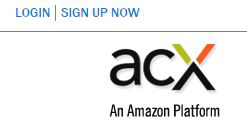ACX 101, Part 4: Budgeting Your Project
Tuesday, January 5th, 2016 Welcome to ACX 101, an article series by a narrator for authors and rights holders new to ACX (the Audiobook Creation Exchange).
Welcome to ACX 101, an article series by a narrator for authors and rights holders new to ACX (the Audiobook Creation Exchange).
This is Part 3: Compensation Models. Use the links at the top of this post to see the previous articles, or get a list of all the articles in the series.
OK, So How Much DO I Budget?
 As an author or rights holder you must make some decisions at this point. Are you going to use a royalty share agreement or per-finished-hour? If the latter, how much do you need to allocate to be able to pay your producer?
As an author or rights holder you must make some decisions at this point. Are you going to use a royalty share agreement or per-finished-hour? If the latter, how much do you need to allocate to be able to pay your producer?
Producers Don’t Like Royalty Share
Here’s the truth- royalty share, from a producer’s perspective, is almost always a losing proposition. Royalty share agreements will in almost every case never produce enough compensation to come close to the actual value of the time and labor involved. Many books will sell only a few copies per month, if even that much, and their return is abysmal. In rare cases, a book can take off, providing thousands in royalties to both the rights holder and producer, but this is not a typical scenario.
This means that the full-time, professional producers are often simply going to avoid royalty share books on ACX. Royalty share projects are often seen as the realm of the novice producer. As a rights holder with a royalty share project, the quality of the auditions you receive will reflect that.
Speaking as a producer, I avoid royalty share projects for some basic reasons.
- Both myself and my family need to eat and simply put, royalty share doesn’t pay the bills. In the rare cases where a book does do well, it only does so briefly, and then the royalties go back to a trickle.
- I don’t like sharing the risk with the rights holder. If a rights holder really does believe their book will sell very well and has market research to back that up, there’s absolutely zero reason to share that revenue with me. If they’re not certain about its viability, there’s no reason for me to take on the risk. I’m not able to take on the risk for long-shot projects, and the vast majority of royalty share projects are exactly that.
OK, Some Producers Like Royalty Share
I shouldn’t do a disservice to those producers who do take on royalty share projects, and are not novices recording from their kitchen table on a $15 Radio Shack microphone. There are some very good producers out there who make royalty share their specialty. Frequently these are folks with either a full-time job who moonlight as a narrator, or more rarely the producer with the long-term vision of building up a massive catalog of royalty share projects and reaping the benefits of small returns on a really big net.
You may be able to find a great producer with a royalty share project. But as I said above, if you truly believe that your book has great sales potential, you shouldn’t be planning to share that revenue with someone else!
Producers Like Per-Finished-Hour
 Most full-time producers who rely on narration as their primary source of income prefer per-finished-hour projects. You know what you’re going to be paid, and there’s no risk that poor sales will hurt your bottom line.
Most full-time producers who rely on narration as their primary source of income prefer per-finished-hour projects. You know what you’re going to be paid, and there’s no risk that poor sales will hurt your bottom line.
Here’s the tiers that ACX offers for Per-Finished-Hour projects:
- $0-$50
- $50-$100
- $100-$200
- $200-$400
- $400-$1000
If you’re serious about your book, you should budget at a minimum $200 per finished hour for its production. $300 per finished hour is a more reasonable target, and will get you access to top-notch production talent.
Breaking Down the Costs
Let’s break down how much time is spent on your audiobook. If you haven’t yet done so, now is a great time to go read the first post in this blog series, ACX 101, Background- the Audiobook Production Process.
The tl;dr (too long; didn’t read) on this is that for each hour of finished audio you receive, a lot more went into it than one hour of work. Your producer has to read the book, prepare the script, record the script, proof the audio (or pay someone to do it), edit the errors (or pay someone to do it) and retakes into the audio, master it, and finally listen to it once more for quality control.
Many producers, including me, will pay a third party to prooflisten their work, and also to edit it. Sometimes this is one person, sometimes it’s two but in the end these other professionals are paid out of what the producer gets paid. The going rate for this kind of work is at a minimum around $50 per finished hour , usually more. Rates vary, of course, and much depends on many factors, but that’s a good ballpark estimate for what it costs your producer to compensate their contractors.
“But wait!” I hear you say. “Why is that my problem? Wouldn’t the producer be better off just doing that work themselves and keeping that money?” The answer is that the producer’s time has value, and if they spend it doing the proofing, editing and mastering, they’re not recording something else, and that means there’s still an opportunity cost for them. Either way, the math is pretty simple.
- $50 per finished hour- I’ve lost money. I had to pay my contractor more than the offered fee, so I’m out of pocket. Alternatively if I do all the work myself, I would spend 3-4 hours per finished hour of audio, and after taxes, fees and other overhead would be making around minimum wage, or even less. I’d do better and more consistently flipping burgers.
- $100 per finished hour- The absolute best I could get here, after taxes, is about $25 per work hour, but realistically is closer to $15 per work hour.
Keep in mind that these figures are absolute best-case scenarios. These numbers are assuming all of the following:
- Almost no errors or need to fix anything in a production.
- The producer is booked full-time, 40 hours per week, 52 weeks per year (this never happens).
- No insurance or healthcare costs, which for non-freelancers are frequently provided through their workplace.
This is obviously nonsensical, and in the real world where you’re not booked full-time, where you have business overhead to deal with, taxes to pay, marketing to do, and all the other things that go along with running a business, not to mention paying for healthcare costs… producing audiobooks for the $0-$50 or the $50-$100 range means either working for less than minimum wage or actually losing money.
The bottom line is that a minimum of $200 per finished hour is necessary to attract the top-quality talent who do this work full time. And when I say minimum, I really do mean that. I’ll be honest with you, unless I’m not booked, I don’t even look at the $100-$200 range of auditions available on ACX. I’m sure I’m not the only narrator who doesn’t bother with lower-paying jobs unless they’ve got some room on the calendar.
It may seem like I’m snubbing perfectly good books, but to me this is a business. I’ve seen some really, REALLY good books that I simply didn’t audition for because they weren’t going to be paying enough. I have to feed my family, pay my mortgage and do all the other things that are necessary, and sentiment or interest in a “cool” project cannot enter my calculus most of the time.
So, What’s Your Budget?
 If you’re going royalty share, then have a super solid marketing plan and be prepared to do the extra legwork to really market your book. If you can impress the narrators who are available with your drive to make it happen, then you’ll have a better shot at getting someone who can deliver a quality product. Look into ACX stipends- they can make a royalty share project interesting to narrators who otherwise wouldn’t take them on.
If you’re going royalty share, then have a super solid marketing plan and be prepared to do the extra legwork to really market your book. If you can impress the narrators who are available with your drive to make it happen, then you’ll have a better shot at getting someone who can deliver a quality product. Look into ACX stipends- they can make a royalty share project interesting to narrators who otherwise wouldn’t take them on.
If you’re going per-finished-hour, set a minimum of $200, preferably higher ($250-$300). Put your project in the $200-$400 bucket, and be clear about what you’re offering up front– don’t make the narrator wonder if you’re offering $200, $300, or $400. Just say it up front in the description. Alternatively, be prepared to negotiate a rate within the range you’ve specified.
If you do this you’ll find that you will get many, many auditions, and while you’ll get a massive volume of poor-quality ones, you will also attract the attention of the professionals who know how to deliver the best possible production, and who wouldn’t even glance at your project listing if it were offered at a lower rate.
Please note that at lower tiers you may find good talent also. Most of the time these are people with full-time jobs who do narration as a moonlighting gig, or to build up a catalog before going full-time. They will generally have to take far longer to produce a book because recording in the evenings and weekends limits your work time. But if you’re on a budget and can’t see any other way, you may be able to find a great producer to help you out.
In Conclusion
I know that many authors and rights holders new to the audiobook production process are going to experience a bit of sticker shock, having thought it would be inexpensive to produce their audiobook. The answer is that, like in most things, you get what you pay for. If your book is really going to sell well in audio form, you shouldn’t share that revenue, which makes royalty share a bad option. From the producer’s perspective, royalty share is very rarely a viable option because it simply doesn’t pay well enough. And in order for a professional audiobook producer to give you the best possible quality production, you’ll have to budget to pay them a rate commensurate with both their skills and their time.
Stay tuned for the next segment of ACX 101- Putting Together the ACX Project Listing!
 Let’s start with the obvious: When producing an audiobook, you are going to have to pay your producer somehow. Narrators have to eat, after all! Some narrators only do voice work part time, moonlighting in the world of narration. Others (like myself) do it as their full-time career, and still others do audiobook work as part of a wider set of voice acting services, like commercials.
Let’s start with the obvious: When producing an audiobook, you are going to have to pay your producer somehow. Narrators have to eat, after all! Some narrators only do voice work part time, moonlighting in the world of narration. Others (like myself) do it as their full-time career, and still others do audiobook work as part of a wider set of voice acting services, like commercials. Under a royalty share agreement, the rights holder (frequently the author, but not always) and the narrator will split the royalties from the sales of the book. When you create a project on ACX, if you elect to use the royalty share compensation model, you are required to grant exclusive distribution rights to ACX and Audible. This means that the audiobook will only be available through Audible, Amazon, iTunes and any other retailers Audible chooses to distribute the book through. Under a Royalty Share Agreement with ACX, you cannot distribute the audiobook yourself in any market or format. This arrangement lasts for seven years. In essence, you are consigning all rights to distribute the audiobook and collect payments for it to Audible. In exchange for this, they pay a higher royalty rate; read on for more details on that.
Under a royalty share agreement, the rights holder (frequently the author, but not always) and the narrator will split the royalties from the sales of the book. When you create a project on ACX, if you elect to use the royalty share compensation model, you are required to grant exclusive distribution rights to ACX and Audible. This means that the audiobook will only be available through Audible, Amazon, iTunes and any other retailers Audible chooses to distribute the book through. Under a Royalty Share Agreement with ACX, you cannot distribute the audiobook yourself in any market or format. This arrangement lasts for seven years. In essence, you are consigning all rights to distribute the audiobook and collect payments for it to Audible. In exchange for this, they pay a higher royalty rate; read on for more details on that.
 You wrote a book, so now sit down and write a plan. Include your research strategies, what you plan to do to promote your book, what your budget for promotion (if any) is, how you plan to reach readers and listeners- then tear it apart and edit it like it’s a first draft. Iterate; lather, rinse and repeat. Share the plan (privately) with others you may trust and get their feedback.
You wrote a book, so now sit down and write a plan. Include your research strategies, what you plan to do to promote your book, what your budget for promotion (if any) is, how you plan to reach readers and listeners- then tear it apart and edit it like it’s a first draft. Iterate; lather, rinse and repeat. Share the plan (privately) with others you may trust and get their feedback.





